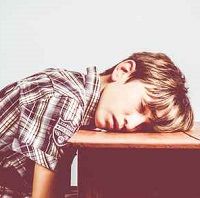Inadequate Sleep in Children Linked with Increased Risk of Emotional Disorders Later in Life
University of Houston researchers suggest that children who experience inadequate or disrupted sleep are more likely to develop depression and anxiety orders later in life.

Candice Alfano, PhD, a clinical psychologist and associate psychology professor at the University of Houston, and Cara Palmer, PhD, a postdoctoral fellow in the Department of Psychology at the University of Houston, are currently conducting a study to determine the precise ways inadequate sleep in childhood produces elevated risk for emotional disorders in later years.
“In particular, we are interested in understanding how children appraise, express, regulate and later recall emotional experiences, both when sleep is adequate and when it is inadequate,” said Alfano, who is also director of the Sleep and Anxiety Center of Houston. “We focus on childhood, because similar to problems with anxiety and depression, sleep habits and patterns develop early in life and can be enduring.”
The research team is working to identify distinct emotional processes that, when disrupted by poor sleep, make children vulnerable to developing anxiety and depression. In order to pinpoint these cognitive, behavioral, and physiological patterns of emotional risk, the investigators are temporarily restricting sleep in 50 pre-adolescent children aged 7 to 11 years.
So far, their study has found that inadequate sleep impacts children’s emotional health by creating more negative emotions, as well as by altering positive emotional experiences. For instance, just two nights of poor sleep can lead to children deriving less pleasure from positive influences or experiences, being less reactive to them, and being less likely to recall details about them later. However, when children receive adequate sleep, these emotional effects are less apparent.
“Healthy sleep is critical for children's psychological well-being,” said Alfano. “Continually experiencing inadequate sleep can eventually lead to depression, anxiety and other types of emotional problems.”
Alfano said parents should consider sleep to be “an essential component of overall health in the same way they do nutrition, dental hygiene and physical activity.”
Difficulty waking up in the morning or daytime sleepiness are signs of inadequate nighttime sleep in children, and can be caused by several factors, including going to bed too late, non-restful nighttime sleep, or an inconsistent sleep schedule.
According to Alfano, the link between sleep disruption and maladaptive emotional processing in childhood is important to study because childhood is when sleep and emotion regulatory systems develop. Along with Palmer, she conducted a review—published online recently in Sleep Medicine Reviews—partly to inform the methods of their current study. The review provides evidence that people are less likely to seek out positive or rewarding experiences that require effort if they do not obtain adequate sleep. The researchers said that these behavioral changes can elevate risk for depression and an overall poorer quality of life.
“There are multiple emotional processes that seem to be disrupted by poor sleep,” said Alfano said. “For example, our ability to self-monitor, pick up on others' nonverbal cues and accurately identify others' emotions diminishes when sleep is inadequate. Combine this with less impulse control, a hallmark feature of the teenage years, and sleep deprivation can create a 'perfect storm' for experiencing negative emotions and consequences.”